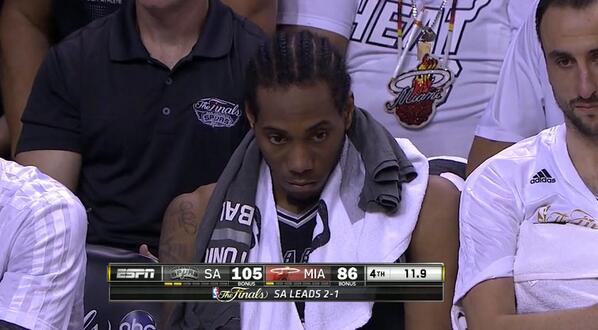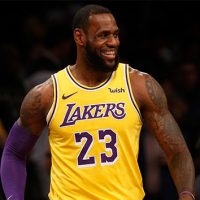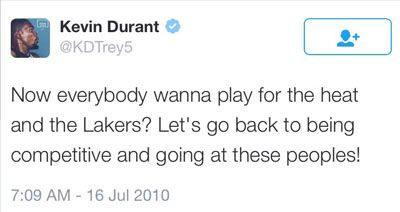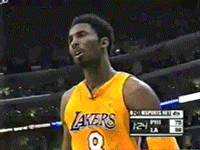Mensagem
por marlonks » Sex Mai 29, 2015 12:25 am
Genial.
LeBron's postseason run reminiscent of Allen Iverson in 2001
2h - NBA LEBRON JAMES
Play2:58
Forward LeBron James says this Cavaliers team is special to him.
Tom Haberstroh, ESPN Staff Writer
181
Shares
Email
Print
Comment
Ever since LeBron James graced the cover of Sports Illustrated, he's been likened to an iconic player. He's Magic Johnson. No, he's equal parts Magic Johnson and Michael Jordan. No, he's Larry Bird. Actually, he's a modern-day Oscar Robertson. Maybe he's a Shaquille O'Neal and Steve Nash hybrid?
The best answer is probably that LeBron James is LeBron James. He has created his own prototype.
But this playoffs, he hasn't been playing like himself at all. Once a beacon of towering efficiency, James has been forced to become a different player, one who has shouldered a massive offensive burden and consequently watched his percentages wilt away.
The injuries to Kyrie Irving and Kevin Love have crunched the offense for James. After posting a career-high 57 percent field goal percentage in the playoffs last season, he's shooting just 43 percent from the floor this postseason and a ghastly 18 percent from downtown. He's shot more than 50 percent in a game just once this entire postseason. That used to be the norm.
And yet, here he is in his most familiar surroundings in the Finals, for a fifth straight season. Same old LeBron, right? Not the case. This version of LeBron is not LeBron, Magic, Michael or Oscar.
This 30-year-old edition of James is 2001 Allen Iverson. And here's why.
The triple-double numbers
It's become cliché at this point to say James "carried" the Cavs to the Finals. Injuries to Irving and Love will do that. But to his credit, James has been brilliant at times. At first glance, James may seem as good as he's ever been. He's averaging 27.6 points while posting career playoff highs in both rebounding (10.4) and assists (8.3).
His Game 3 triple-double against the Atlanta Hawks with 37 points, 18 rebounds and 13 assists will go down as one of his most eye-popping box scores of his playoff career. But that Game 3 was his 2015 postseason in a nutshell: jaw-dropping marks in the triple-double categories balanced with gobs of missed shots and turnovers -- and a win.
LeBron's Postseasons 2006-15
YEAR PER THRU CONF FINALS
2015 24.8
2014 31.1
2013 29.0
2012 31.3
2011 27.3
2010 28.4
2009 37.6
2008 24.6
2007 26.6
2006 23.1
In that same game, James took a career-high 37 field goal attempts and missed a career-high 23. That's not like him. To put that in perspective, James missed more shots in that game than he took in any game against the Indiana Pacers or San Antonio Spurs last postseason. And he fumbled the ball six times.
All those misfires matter because winning with rampant inefficiency is not a sustainable formula for success. The truth is that various measures -- including PER and win shares -- point to this being James' least productive postseason since he was a 23-year-old playing with Joe Smith as his top big off the bench.
Don't get this wrong: James is still a great player. But this is not his finest performance by any stretch of the imagination. He's become a high-volume, low-efficiency superstar making the most of his circumstances, the way Iverson did in 2000-01. Let's go through the three striking similarities.
1. James, the high-volume scorer
With Irving hobbled, James has taken on a massive scoring load. The numbers bear this out. To quantify it, we have a handy metric called usage rate, which estimates how much of the team's offense a player uses via field goal attempt, free throw attempt or turnover.
So far this postseason, according to Basketball-Reference.com, James has posted a usage rate of 36.4 percent, which is an NBA high that also ties a career high he had in the 2008-09 postseason, when he averaged a mind-numbing 35.3 points. In terms of scoring load, James is in another stratosphere compared to his peers. To wit: Curry ranks second at 31.8 percent.
But James has also been wildly inefficient. His field goal percentage of 42.8 percent doesn't quite do it justice. He's shooting 17.6 percent from downtown and making 76 percent of his free throws. Once you factor in 3-point shooting and free throw shooting, we find out that his true shooting percentage sits at just 49.2 percent, while 52.4 percent is league average.
Have we ever seen such high usage and low efficiency before?
Yes. Iverson in 2001. The chart below shows us the top 50 highest usage postseasons in the Basketball-Reference database with a minimum 14 games and their respective shot efficiencies, as measured by true shooting percentage.
Tom Haberstroh
Notice James and Iverson alone in the bottom right corner? That's the high-usage, low-efficiency zone. With role player Aaron McKie as his second-leading scorer, Iverson averaged 32.9 points that postseason, firing up 30.0 shots on 38.9 percent shooting. His usage rate and true shooting percentage stood at 36.8 percent and 48.0 percent, respectively. James this postseason? Almost identical at 36.4 and 49.2.
This chart also illustrates that this version of James and last season's exist on opposite ends of the spectrum. See the dot at the top left of the chart? That's James last year. Hard to believe it's the same player. And just in case you were wondering who has the highest usage rate ever, it's -- who else? -- Jordan in 1993.
Looking at scoring loads and how they've converted shots, it's plain to see that 2015 James and 2001 Iverson are kindred spirits. But the similarities don't end there.
2. The "carrying" myth
It's an easy trap to fall in. Irving is hobbled. Love is gone. In the absence of a second healthy star, we tend to ignore defense and reflexively heap praise on the lone superstar to say he's carrying the team. It's a shortcut that makes it easier to make sense of a complex situation. And so it goes, James is carrying the Cavs in the same way Iverson dragged the 2001 76ers to the Finals.
Only that's not entirely true. Saying that James is carrying the Cavs is a veiled insult to the rest of the roster, which has done an superb job of picking up the slack. It's not fair to Tristan Thompson, Timofey Mozgov, Matthew Dellavedova, J.R. Smith and Iman Shumpert, who have all had a breakout postseason. As Insider pal Bradford Doolittle pointed out earlier this week, the Cavs actually have had a strong supporting cast in the playoffs, which slaps the face of conventional wisdom. Of note: The Cavs actually outscored the Hawks by 13 points without James on the floor in the series.
What's buoying the Cavs' resurgence is the same thing that catapulted the 2001 76ers: offensive rebounding and defense. Led by Thompson and Mozgov crashing the boards like mad men, the Cavs rank first among all playoff teams in offensive rebound rate (28.5 percent) and second-chance points (15.8 per game). It's a new look for them. In the regular season, the Cavs ranked sixth and 18th in the respective categories.
The defense has been a revelation as well. The Cavs held the Hawks to 97.9 points per 100 possessions, eight points below their 106.2 rate in the regular season, which is still impressive even considering their injuries. Against the Cavs, the Chicago Bulls were held 4.8 points per 100 possessions under their regular-season average. The Boston Celtics saw their offensive efficiency suffer as well. This isn't to say that James doesn't have a hand in that (he does), but the Cavs' sharpening their defense to a top-3 rate this postseason has as much to do with their Finals ticket as anything.
Defense and offensive rebounding were the calling cards of Larry Brown and his 2001 76ers, who boasted a nasty backline of Dikembe Mutombo, George Lynch and Tyrone Hill. While Iverson piled up huge scoring numbers, the supporting cast pulled more than their weight.
We often hear that MVP Iverson carried the 2001 76ers, but what gets lost in the conversation is that Mutombo won Defensive Player of the Year and led the NBA in offensive rebound rate that season, and McKie was named Sixth Man of the Year. That Philadelphia team ranked 13th in offense but fifth on defense and second in offensive rebound rate. Who carried whom?
LeBron has looked more like Iverson circa 2001 instead of himself during this postseason. Jonathan Daniel/Getty Images
3. The conference disparity
The third commonality between 2015 James and 2001 Iverson goes beyond high-volume scoring and their teams' overall fingerprint. Both James and Iverson benefited from diluted conferences. This season, the Eastern Conference registered a .469 win percentage against the Western Conference, the fifth lowest we've seen in the past two decades.
Believe it or not, the conference landscape in 2000-01 was even more lopsided than this current one. The Eastern Conference posted a .460 win percentage against the Western Conference, the third-worst rate since 1996-97. According to Basketball-Reference's simple rating system that accounts for strength of schedule, the six best teams in the NBA that season all hailed from the West. Sound familiar?
(Remember, the 2001 Sixers reached the Finals after one of the most controversial series in playoff history. The Sixers had a 186-120 free throw advantage across their seven games with the Bucks, causing then-coach George Karl and Milwaukee's star Ray Allen to get hit with $85,000 fines for criticizing referees.)
The Cavs have certainly earned their spot in the Finals. But in the same way that the Sixers took advantage of a down season in its conference, James and the Cavaliers should also give proper due to the league's conference alignment. They're making the most of the golden opportunity.
In all likelihood, James will find a similar fate as 2001 Iverson. In Golden State, the Cavs are going up against one of the best regular-season teams in NBA history. In 2001, Iverson and the Sixers faced a sleeping-giant Lakers team that swept all three series en route to the championship. Thanks to Iverson's 48 points on 41 shots, the Sixers won Game 1 in overtime (Cleveland assistant coach Tyronn Lue remembers it well). But then, reality sunk in and the Sixers dropped the next four games to Shaquille O'Neal and Kobe Bryant's Los Angeles Lakers.
To be clear, comparing James to Iverson isn't a slight. Iverson is an all-time great, one of the biggest icons the sport has ever seen. But if James wants to get past the juggernaut Golden State Warriors, he can't be 2001 Iverson. James has to get back to being his more efficient self.
Sao as finais mais Lake ever.
 Like, I have no idea what you guys are talking about.
Like, I have no idea what you guys are talking about.















